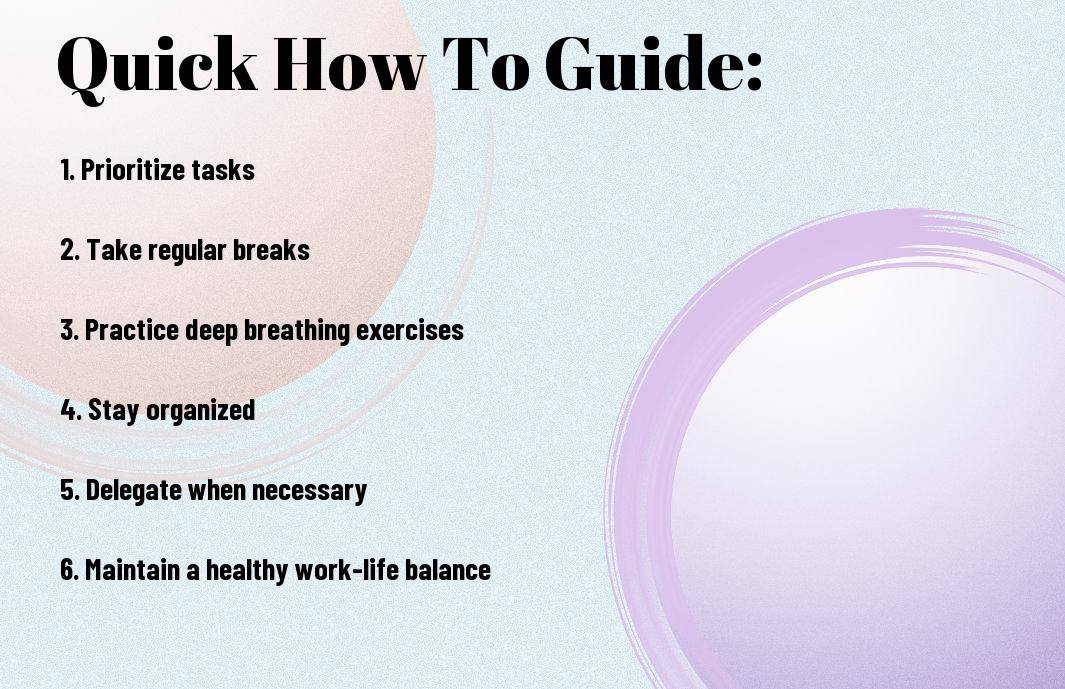
Newsletter Subscribe
Enter your email address below and subscribe to our newsletter

Enter your email address below and subscribe to our newsletter

In today’s fast-paced world, stress has become a common companion for many professionals. Juggling numerous responsibilities and striving for high productivity can often lead to burnout and a decline in overall well-being. However, it is crucial to find a balance between work and self-care to ensure optimal performance while maintaining mental and physical health.
You can learn effective strategies to manage stress levels and boost productivity simultaneously. By implementing simple yet powerful techniques, you can create a harmonious routine that promotes efficiency and well-being in both your professional and personal life.

There’s no denying that the modern workplace can be a breeding ground for stress. To effectively manage and reduce stress levels, it’s crucial to first identify and understand the various triggers that can lead to heightened stress in the workplace.
Workplace internal stressors are factors that originate within an individual’s mind and body. These can include self-imposed pressure to excel, perfectionism, fear of failure, or even poor work-life balance. It’s imperative for individuals to be aware of these internal stressors and take proactive steps to address them. This could involve practicing mindfulness, setting realistic goals, or seeking support from colleagues or mental health professionals.
Stress triggered by external factors in the workplace can stem from various sources such as heavy workloads, tight deadlines, conflicts with colleagues, or a toxic work environment. Addressing external stressors is crucial for maintaining a healthy work-life balance and preventing burnout. Employers can play a significant role in mitigating external stressors by promoting a positive work culture, providing adequate resources, and encouraging open communication among team members.
This proactive approach can lead to increased job satisfaction, improved productivity, and a more positive work environment overall.

Not all tasks are created equal, which is why learning to prioritize effectively can significantly impact your productivity. One popular method that can help you classify and prioritize your tasks is the Eisenhower Matrix, also known as the Urgent-Important Matrix.
Some tasks are urgent but not important, some are important but not urgent. By categorizing your tasks into four quadrants based on these criteria, you can focus on what truly matters and avoid getting overwhelmed by less critical activities. This method encourages you to delegate, defer, delete, or do tasks based on their priority level.
Even with a clear list of prioritized tasks, it can be challenging to maintain focus and productivity. The Pomodoro Technique is a time management method that can help you break down work into intervals, usually 25 minutes in length, separated by short breaks. This technique aims to improve productivity and focus by limiting distractions and promoting regular rest periods.
For instance, setting a timer for each work interval can help you stay on track and maintain a sense of urgency. By committing to working on a task for a specific period and then taking a short break, you can avoid burnout and improve your overall efficiency.
Many individuals struggle to find a balance between managing stress and maintaining high productivity in their daily lives. For valuable insights on this delicate balance, check out Balancing Act: 5 Tips for Managing Stress and Maintaining Work-Life. It is crucial to incorporate effective stress management strategies into your routine to improve overall well-being and performance.
Even a few minutes of mindfulness or meditation each day can significantly reduce stress levels and increase your focus and productivity. These practices help calm the mind, bring awareness to the present moment, and alleviate the constant noise and distractions that contribute to stress. By incorporating mindfulness techniques into your daily routine, you can better manage stress and enhance your overall quality of life.
Strategies involving physical activity such as exercise, yoga, or even a short walk can be powerful tools for managing stress. Physical activity releases endorphins, which are known to improve mood and reduce stress levels. Incorporating regular physical activity into your routine not only helps you manage stress but also contributes to better physical health and overall well-being.
The role of physical activity as a stress reliever cannot be understated. Engaging in regular exercise not only reduces stress levels but also improves cognitive function and boosts energy levels. By making physical activity a priority, you can effectively combat stress and enhance your productivity.
The quality and quantity of sleep play a crucial role in managing stress and promoting overall well-being. Consistent, adequate sleep is crucial for recharging the body and mind, allowing for better stress management and improved cognitive function. Lack of sleep can lead to increased stress levels, irritability, and decreased productivity. By prioritizing a consistent sleep schedule and creating a relaxing bedtime routine, you can improve your ability to manage stress effectively.
On average, adults need 7-9 hours of sleep each night to function optimally. Quality sleep is vital for maintaining emotional balance, enhancing memory and learning capabilities, and boosting overall well-being. Establishing healthy sleep habits is crucial for managing stress and maintaining high productivity levels.
Stress is an unavoidable part of life, but how we manage it can make a significant difference in our well-being and productivity. By incorporating mindful practices, engaging in physical activity, and prioritizing adequate sleep, individuals can effectively manage stress and improve their overall quality of life. Remember that taking care of your mental and physical health is crucial for achieving long-term success and well-being.
Despite the numerous technological advancements that have been made to simplify our lives, many of us still struggle to manage our time effectively. The key to boosting productivity lies in mastering the art of time management. By implementing smart strategies and techniques, you can maximize your efficiency and minimize stress levels.
If you want to enhance your productivity, it’s crucial to set realistic and achievable goals. The key is to break down your larger objectives into smaller, more manageable tasks. This not only makes your goals less daunting but also helps you stay on track and maintain momentum. Setting specific deadlines for each task can further motivate you to work efficiently and effectively.
While it may be tempting to put off tasks for later, procrastination is a productivity killer. It can lead to stress, missed deadlines, and a decline in the quality of your work. To combat this habit, try implementing strategies such as the “two-minute rule,” where tasks that can be completed in two minutes or less are done immediately. Additionally, breaking tasks into smaller, more manageable chunks can make them seem less overwhelming and reduce the urge to procrastinate.
Better managing your time and avoiding procrastination are crucial aspects of boosting productivity. Procrastination can be a major roadblock to success, causing unnecessary stress and hindering your ability to meet deadlines. By implementing smart time management strategies and breaking down tasks into bite-sized chunks, you can stay on top of your workload and achieve your goals efficiently.

Now, in the quest for achieving a harmonious work-life balance, it’s crucial to consider the impact of diet on your overall performance. A well-balanced diet not only contributes to your physical health but also has a significant effect on your mental well-being and productivity. For more insights on maintaining a healthy work-life balance, check out Balancing Act: The Ultimate Guide to Achieving Work-Life Harmony.
You can boost your productivity by incorporating stress-fighting foods into your diet. Foods rich in omega-3 fatty acids such as salmon, walnuts, and chia seeds can help reduce inflammation and promote brain health, enhancing your cognitive function. Adding antioxidant-rich fruits like berries and dark leafy greens can also provide a protective effect against stress and improve your overall well-being.
When considering eating healthy amidst a busy workday, it’s crucial to plan ahead and make mindful choices. Opt for nutrient-dense snacks like Greek yogurt with nuts or cut-up vegetables to keep your energy levels stable throughout the day. Stay hydrated by keeping a water bottle at your desk and avoid sugary drinks that can lead to energy crashes. Remember to take short breaks to enjoy your meals mindfully and recharge your body and mind.
Relationship
In addition to choosing nutritious foods, scheduling regular meals and snacks throughout the day can help stabilize your blood sugar levels and prevent energy dips. Recognizing the connection between what you eat and how you feel can empower you to make healthier choices and boost your performance at work.
Performance
Maintaining a diet rich in crucial nutrients and antioxidants can have a profound impact on your performance. By fueling your body with the right foods, you can enhance your focus, concentration, and overall cognitive function. Bear in mind, a healthy diet is not only about physical health but also about optimizing your mental well-being for peak performance.

Your professional life can often demand a lot of your time and energy, leaving little room for personal activities and relaxation. However, it’s crucial to find a balance between the two to avoid burnout and maintain overall well-being. By effectively managing your professional and personal life, you can enhance your productivity and find fulfillment in both aspects of your life.
You must learn the art of saying ‘no’ to tasks or commitments that can overwhelm you and detract from your overall well-being. It’s necessary to prioritize your time and energy on tasks that align with your goals and values. Saying ‘no’ can be empowering and help you set boundaries that protect your time for activities that truly matter to you. Do not forget, saying ‘no’ is not a sign of weakness but rather a sign of self-awareness and autonomy.
For a well-rounded and balanced life, it’s crucial to schedule downtime for yourself. This time should be dedicated to activities that rejuvenate you and help you relax. Whether it’s spending time with loved ones, engaging in a hobby, or simply resting, downtime is necessary for recharging your batteries and enhancing your overall well-being. Avoiding downtime can lead to burnout, decreased productivity, and even health issues. Make it a priority to schedule regular downtime in your calendar to ensure a healthy work-life balance.
Personal activities and relaxation are just as important as your professional responsibilities. Make sure to prioritize self-care and downtime to maintain high productivity and overall well-being. Do not forget, it’s okay to say ‘no’ to tasks that don’t align with your goals and values. Balancing your professional and personal life is a continual process that requires mindfulness and proactive decision-making.
Unlike other eras, the technological advancements of today offer numerous tools and applications that can help individuals manage stress and boost productivity in the workplace. Consult the article The Balancing Act – Career Growth, Stress Management and Avoiding Work-Related Injuries for more insights on this delicate balance.
Assuming you are looking to improve focus and efficiency, utilizing apps like StayFocusd and tools such as Pomodoro Technique can be immensely beneficial. These resources can help you break down work into manageable chunks, set specific focus periods, and track your productivity levels to optimize your performance.
The important aspect of managing stress and maintaining high productivity is knowing when to disconnect. The constant connectivity offered by technology can lead to burnout if not managed correctly. The key is to establish boundaries, schedule digital detox time, and engage in activities that promote relaxation and mental well-being.
Tools like mindfulness apps, meditation techniques, and nature walks can help in rejuvenating your mind and body, allowing you to return to work with renewed energy and focus. Note, it is crucial to unplug and recharge regularly to avoid burnout and maintain long-term productivity.
From above, it is evident that maintaining a balance between managing stress and achieving high productivity is crucial for overall well-being and professional success. By implementing strategies such as time management, self-care practices, and open communication, individuals can effectively navigate the challenges of a demanding work environment while safeguarding their mental and physical health. It is important to recognize the signs of stress and take proactive steps to address them, rather than letting stress build up and negatively impact our performance and personal life.
Ultimately, finding the right balance between stress management and productivity is a skill that requires practice and ongoing adjustments. By prioritizing self-care, setting boundaries, and seeking support when needed, individuals can create a sustainable work routine that promotes both professional success and personal well-being. Recall, it is okay to ask for help and to take breaks when necessary – your health and productivity depend on it.
A: Stress management refers to a set of techniques and therapies designed to control a person’s levels of stress, especially chronic stress. It is important because prolonged stress can have negative effects on both physical and mental health, as well as productivity.
A: Stress can impair cognitive function, decrease focus and concentration, and lead to feelings of overwhelm and burnout, all of which can significantly reduce productivity levels.
A: Some effective strategies for managing stress include practicing mindfulness and meditation, exercising regularly, maintaining a healthy work-life balance, seeking social support, and engaging in relaxation techniques such as deep breathing exercises.
A: Maintaining a balanced lifestyle that includes proper nutrition, regular exercise, sufficient sleep, and time for relaxation can help improve resilience to stress and promote overall well-being.
A: Setting boundaries involves clearly defining limits on what you are willing to do or tolerate, both at work and in your personal life. This can help prevent feelings of overwhelm and protect your time and energy reserves, reducing stress levels.
A: Effective time management can help prevent feelings of being overwhelmed, as it allows you to prioritize tasks, set realistic goals, and allocate time for both work and relaxation, ultimately reducing stress levels and improving productivity.
A: If you find that your stress levels are significantly impacting your daily life, relationships, or work performance, it may be time to seek professional help from a therapist, counselor, or healthcare provider who can provide guidance and support tailored to your specific needs.